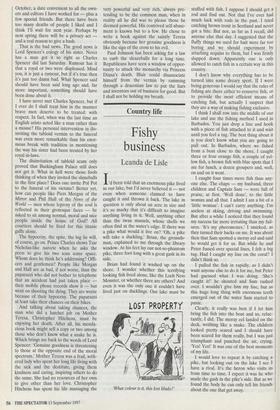Country life
Fishy business
Leanda de Lisle
I'd been told that an enormous pike lived in our lake, but I'd never believed it — not even when someone claimed to have caught it and thrown it back. The lake in question is only about an acre in size and it's so murky that it's difficult to imagine anything living in it. Well, anything other than the swan mussels, whose shells we often find at the water's edge. If there was a pike what would it live on? 'Oh, a pike will take a duckling,' Brian, the grounds- man, explained to me through the library window. At his feet lay our not-so-phantom pike, three foot long with a great gash in its side.
Brian had found it washed up on the shore. I wonder whether this terrifying looking fish lived alone, like the Loch Ness Monster, or whether there are others? And even it was the only one it couldn't have lived just on ducklings. Our lake must be `What colour is it, this lost libido?' stuffed with fish. I suppose I should get a rod and find out. Not that I've ever had much luck with rods in the past. I tried catching brown trout in Scotland and never got a bite. But nor, as far as I recall, did anyone else that day. I suggested that the fluffy things we used for bait were far too boring and we should experiment by attaching sequins to them, but I was firmly slapped down. Apparently one is only allowed to catch fish in a certain way in this country.
I don't know why everything has to be turned into some dreary sport. If I were being generous I would say that the rules of fishing are there either to conserve fish, or to provide the most efficient means of catching fish, but actually I suspect that they are a way of making fishing exclusive.
I think I shall row into the middle of our lake and use the fishing method I used in Barbados. You just drop a line and hook with a piece of fish attached to it and wait until you feel a tug. The best thing about it is you don't know what you are going to pull out. In Barbados, where we fished from a boat close to the shore, I caught three or four orange fish, a couple of yel- low fish, a brown fish with blue spots that I ate for lunch, a dozen groupers and, well, on and on it went.
I caught four times more fish than any- one else. The chaps — my husband, three children and Captain Sam — were full of praise, at first. 'Well done', to the little woman and all that. I admit I am a bit of a `little woman'. I can't carry anything. I'm useless at skiing, driving and swimming. But after a while I noticed that they found my success far more irritating than my fail- ures. 'It's my pheromones,' I smirked, as they turned their backs on me. It was about then that Sam spotted a moray eel and said he would get it for us. But while he and Peter fussed over special lines, I felt a big tug. Had I caught my line on the coral? I didn't think so.
I pulled the fish in rapidly, as I didn't want anyone else to do it for me, but Peter had guessed what I was doing. 'She's caught it!' he shouted and Sam rushed over. I wouldn't give him my line, but as this huge long thing with enormous teeth emerged out of the water Sam started to panic.
Clearly, it really was best if I let him bring the fish into the boat and so, reluc- tantly, I did. The moray eel landed on the deck, writhing like a snake. The children looked pretty scared and I should have been scared for them really, but I was just triumphant and punched the air, crying, `Yes! Yes!' It was one of the best moments of my life.
I would love to repeat it by catching a pike, but looking out on the lake I see I have a rival. It's the heron who visits us from time to time. I expect it was he who made the gash in the pike's side. But as we found the body he can only tell his friends about the one that got away.


































































 Previous page
Previous page